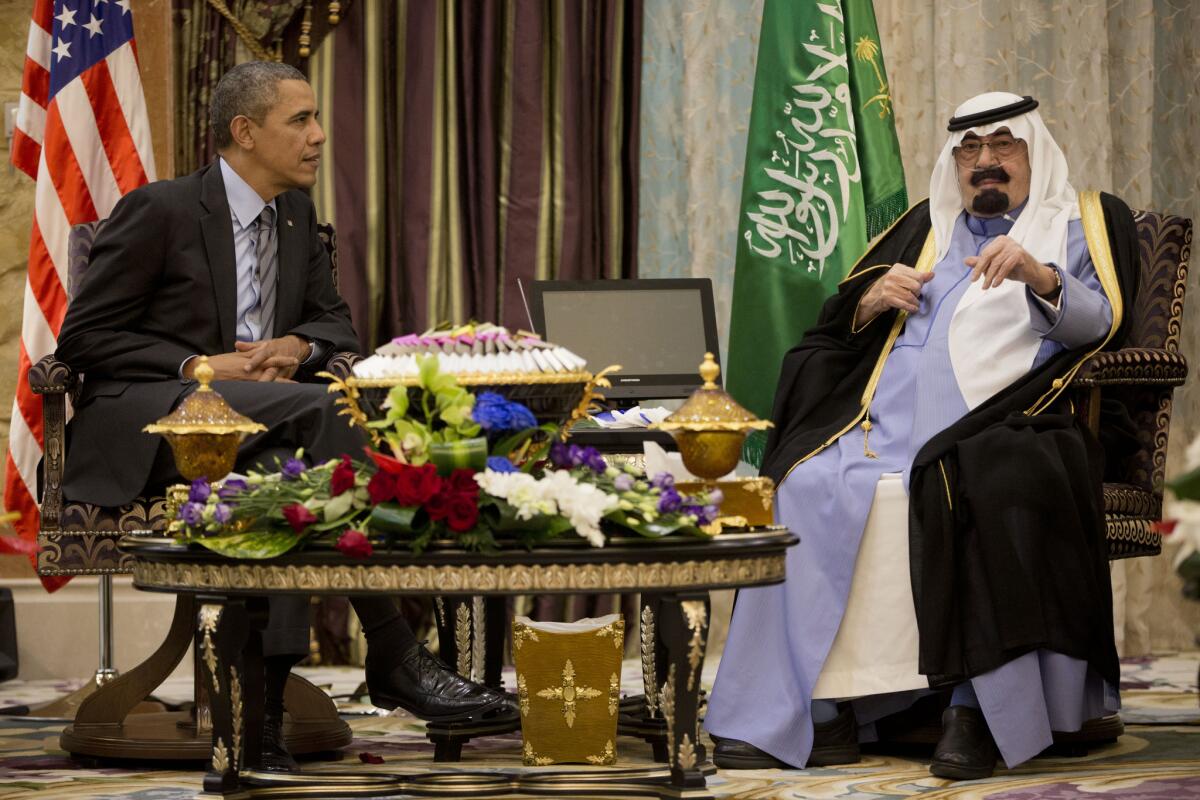Op-Ed: The path of post-Soviet Europe isn’t on the map in the Middle East

- Share via
The fall of the Berlin Wall 25 years ago this month signaled the unmatched strength of U.S. economic and military power, but it also reflected the seductive charisma of American democracy and its open, pluralistic, prosperous society — or so Americans thought at the time.
So why, then, has that same combination of American hard and soft power failed to serve as a catalyst for liberalism in the Middle East?
One reason is that U.S. foreign policy objectives in Eastern and Central Europe were more clearly defined than our goals in the Middle East have been, and our tools, strategies, and tactics — hard and soft — were married to those objectives.
When the wall stood, America’s objective was to contain the Soviet Union while supporting nascent democratic forces in countries such as Poland. After the wall fell, the objective became the full integration of Central European countries into the North Atlantic Treaty Organization and the European Union. By contrast, in the post-Arab Spring Middle East, U.S. policy seems devoid of such long-term strategic objectives. This problem is clearly evident as the U.S. struggles to articulate how its previous goal of removing President Bashar Assad fits into its new struggle against the Islamic State militant group.
Another factor is that in Europe, the U.S. desire to promote democracy did not face competing interests. In the Middle East, the U.S. has many interests — including battling terrorism — that compete with promoting democracy. In a May 2011 speech at the State Department, President Obama vowed to provide diplomatic, economic and strategic aid to boost a swift transition to democracy in the Arab Spring countries. But since then, his administration’s focus on democracy promotion has dwindled.
The twists and turns of American policy toward Egypt illustrate the complications. Obama supported the Cairo street demonstrations that began in 2010, and he put pressure on Egyptian President Hosni Mubarak to step down. But when the Muslim Brotherhood’s Mohamed Morsi was elected president, he grew wary, and when the Egyptian military ousted Morsi in July 2013, Obama was careful not to call it a coup. Since then, he has met with Egypt’s new president, the former military strongman Abdel Fattah Sisi, something he never did with Morsi.
In theory, the U.S. supports greater democracy around the world. But enduring American interests in the Middle East continue to incline its foreign policy to emphasize security and stability over democracy. One of those interests is oil; another is the need for close cooperation on counter-terrorism with autocratic leaders, and another is the West’s deep-seated fear of ascendant Islamism.
Another difference between today’s Middle East and post-communist Europe is that in Europe, the U.S. had a vital partner in promoting democracy: the European Union. The promise of EU expansion to the east served as a crucial motivator for democratic reform. No such incentive exists in the Middle East.
Moreover, in post-communist Europe no countervailing powers weakened U.S. or European democratic leverage. Russia was weak, and Germany was committed to the democratization and Europeanization of its eastern neighbors. By contrast, oil-rich Persian Gulf states such as Saudi Arabia, Qatar and the United Arab Emirates have provided massive infusions of cash to Arab Spring countries, often dwarfing aid from the West.
Just a week after a 2013 coup that overthrew Morsi, the Saudis announced a $12-billion aid package for the country, and a month later they promised to make up for any aid cut by Western donors to punish Egypt’s military leaders for their undemocratic actions. Gulf state governments have their own interests in the Arab Spring countries, and promoting democracy is not high on the list, given their desire to preserve their own long-standing autocracies.
A final difference between the situation in Eastern Europe then and the Mideast now has to do with U.S. credibility. In 1991, when then-Secretary of State James Baker traveled to Albania, 300,000 newly liberated Albanians turned out to greet him, even kissing the wheels of his car. But as Baker later noted, the adoration wasn’t for him. Rather it was for what he represented: the hope of American democracy.
By contrast, in the Middle East, close relations between successive U.S. administrations and autocratic rulers have undermined the faith of the people in U.S. intentions. Many Arabs associate American efforts to promote democracy with the 2003 U.S.-led invasion of Iraq and the policies of George W. Bush, which further lowers the credibility of U.S. policies.
So what can be done?
The Middle East will never present the opportunity for nurturing new democracies that Eastern and Central Europe did in 1989, in part because of the perceived failure of nation-building experiments in Iraq and Afghanistan.
But policy adjustments in Washington could improve the ability of America to support democracy in the Middle East.
We need a clear formulation of strategic objectives that emphasizes broader diplomatic goals over preoccupations such as counter-terrorism. We need to coordinate more closely with Europe and
consistently and robustly champion democratic principles. And we need to be more willing to push our Gulf allies to play a positive role in countries such as Libya, Bahrain and Egypt.
Democracy alone cannot solve the region’s entrenched problems. But recent history makes it clear that they have no chance of being solved if the autocratic status quo remains in place.
Mieczyslaw P. Boduszynski, who formerly served as a U.S. diplomat in Libya, is an assistant professor of politics and international relations at Pomona College. Cameron Munter, a career diplomat now teaching at Pomona College, was U.S. ambassador to Pakistan from October 2010 to July 2012.
Follow the Opinion section on Twitter @latimesopinion
More to Read
A cure for the common opinion
Get thought-provoking perspectives with our weekly newsletter.
You may occasionally receive promotional content from the Los Angeles Times.









